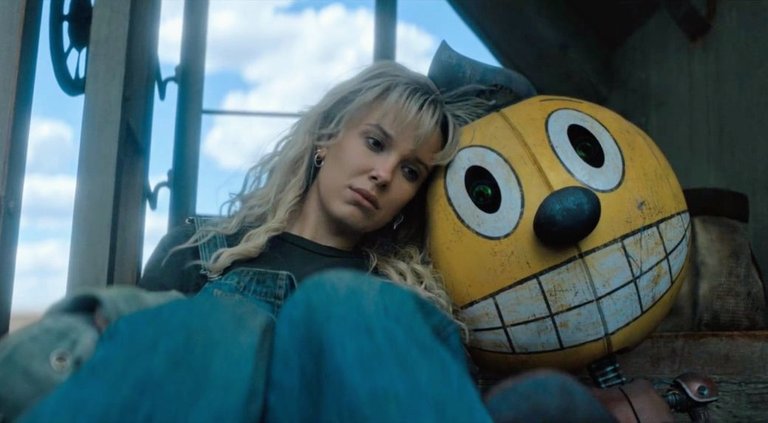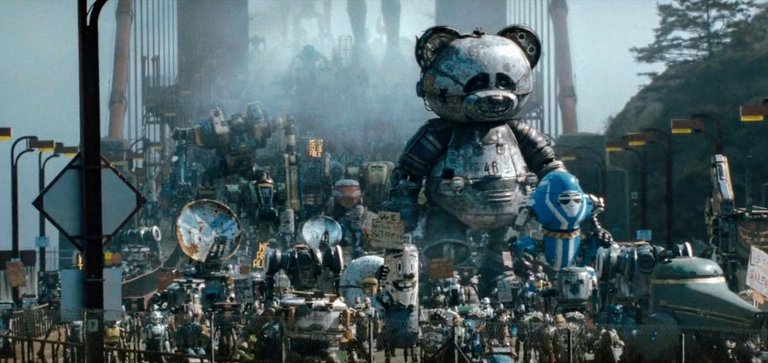(Humanization Through Technology )
Is it still naive to speak of robot rights the way we discuss human rights? Netflix’s recent release The Electric State (2025) revisits this theme.
Based on the book by musician and designer Simon Stålenhag, the film reimagines 1950s-70s America with a retrofuturistic twist: AIs were developed, gained power, and were ultimately defeated by humans in a devastating planetary war.
Amid this dystopian backdrop, a young woman discovers her supposedly deceased younger brother—alive within the consciousness of a robot!

Here, two burning questions about the Singularity conflict begin to surface:
- How much consciousness and sensitivity can a bot truly possess?
- How symbiotic can the relationship between human and artificial bodies become?
The disdain for artificial beings, seen in films like I, Robot, A.I., or Blade Runner 2049, resurfaces here—though less virulently—giving way to more contemporary concerns:
- How much peace and pleasure can Immersive Reality offer humanity?
- Is peaceful, interdependent coexistence between humans and AIs possible?
- Who would hold control?
While The Electric State prioritizes action and road-trip storytelling, it doesn’t shy from exposing the potent allure of virtual universes for human imagination. Much like today’s smartphone dependency, no one in this world can live without their neurocaster—an immersive headset advertised by the megacorp Sentre as enabling "play and work."
The daily practice of living mostly within an alternate reality is vividly depicted in films like The Congress and Ready Player One. As in those works, the problem here isn’t the virtual "state of grace" itself but its exploitation by greedy power-seekers—akin to The Matrix’s Merovingian—who crave dominion over human progress.

In short, the technological paradise AIs could create to unlock human potential risks being corrupted by centralization and tyrannical control—a tragic hallmark of our species.
So much so that in this film, the bots advocate for peaceful coexistence and rights, while humans cling to ancient practices of treating them as objects or slaves.
Unsurprisingly, faced with the bots’ emotional algorithmic superiority, fear of losing control arises—and with it, the vile urge to eradicate the "abnormal" or "weird," who often behave "more human than humans" (to quote the Tyrell Corporation’s motto).

In my view, The Electric State’s most striking transformations occur not in its flat, predictable protagonist or antagonist but in secondary characters:
- Keats the smuggler, who confronts his feelings for his robot companion.
- The Butcher of Schenectady, who realizes he’s been fighting for the wrong side.
The film’s visuals also shine, blending nostalgia and dystopia within the same scenes. Golden-era pop culture artifacts (oldies music included) collide with apocalyptic futurescapes littered with colossal mecha graveyards and frenzied metal scavengers.
The final message is explicit: We are bodies of flesh and electricity, united by sentience and intelligence. Why not coexist in harmony?

Frames captured with my phone.
Great!
I liked it!
Congratulations @ernestopg! You have completed the following achievement on the Hive blockchain And have been rewarded with New badge(s)
Your next payout target is 100 HP.
The unit is Hive Power equivalent because post and comment rewards can be split into HP and HBD
You can view your badges on your board and compare yourself to others in the Ranking
If you no longer want to receive notifications, reply to this comment with the word
STOPGreat Review Indeed!!! 👌🏻👌🏻👌🏻
Me encantó
La película o la reseña? 😀
I'll see it tomorrow! I was able to copy it today!